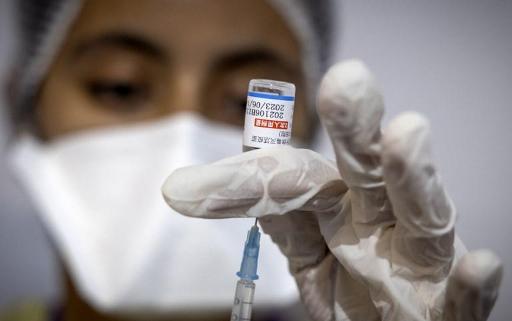Vaccinations against the Covid-19 have reduced the risk of infection by 80.6%, according to data released by Belgium’s Vaccination Task Force at a press conference on Saturday.
Infections have been less frequent among vaccinated persons in Belgium. From 2 to 8 August, the incidence of new infections was 200 per 100,000 inhabitants for the unvaccinated as against 39 per 100,000 persons for the vaccinated.
The protective effect of the vaccines is also reflected by a reduced risk of death and hospitalization. The rate at which people infected with the virus are being admitted to hospital has gone down significantly.
Among residents of senior citizens’ homes, it went from 11.4% during the second wave of infections to 2.4% in the third wave. Similarly, 0.6% of infected health professionals were hospitalised in the third wave, as against 1.5% during the previous one.
Task Force head Dirk Ramaekers said at Saturday’s press conference that the vaccination campaign was nearing saturation, particularly in Flanders and Wallonia. However, the goal of vaccinating 70% of the population has not yet been attained in Brussels.
Belgium now ranks fourth in Europe for the percentage of its population that is fully vaccinated against COVID-19, behind Malta, Iceland and Ireland. Close to 90% of Belgians with underlying health conditions are fully vaccinated.
From Israel, the first country to launch a booster campaign to vaccinate elderly people besides people with underlying conditions, it was reported that a third shot of the vaccine (Pfizer-BionNTech) is 86 % effective in preventing COVID-19 among those 60 and older. The campaign has been expanded to include people aged 40 and up.
Other new figures from Israel show that unvaccinated people are eight times more likely to experience severe symptoms than fully vaccinated people.
The speed of vaccination in Belgium is no longer a matter of vaccine deliveries but depends, rather, on the number of persons wishing to be vaccinated. Since July, this has been the decisive factor, according to the Task Force.
For now, the only vaccines the country is receiving come from the Pfizer/BioNtech lab. Deliveries of the AstraZeneca and Johnson & Johnson vaccine have been interrupted, while Moderna’s has been suspended.
“We stopped administering first doses of the AstraZeneca vaccine in July,” Ramaekers said.
“The European contract has been stopped and not renewed. Relations with AstraZeneca have thus not been simple. Deliveries promised were not supplied.”
Supplies of the Johnson & Johnson vaccine have also been interrupted since it is being used to a maximum for the COVAX programme - a global initiative that seeks to guarantee fair access to vaccines for every country in the world - in developing countries.
The Johnson & Johnson vaccine was supposed to be manufactured (fill & finish operation) at a facility in South Africa for delivery to the country and the rest of Africa. However, most of the doses finished in South Africa have until now been delivered to Western countries because of problems at Johnson & Johnson’s plant in the US. As a result, EU kept more doses than planned.
“Because of the problems, South Africa and the EU agreed to the change the allocation of doses during a limited period of time,” Eric Mamer, chief spokesperson of the European Commission, told The Brussels Times on Thursday. “Towards the end of September, the original allocation will take over.” It was not clear if the EU intends to compensate South Africa for the loss of doses during the Summer.
Belgium still has doses of the Johnson & Johnson vaccine in stock. These are being placed on hold to focus on COVAX.
“We are taking (the possibility of administering) a third dose into consideration,” the Task Force chairman said. “We are not worried about the number of doses available,” he added.
In the meantime, Belgium has been able to donate vaccines to third countries. Since mid-July it has sent doses to Tunisia, Ukraine, Armenia and Kosovo, according to the Task Force.
Note: The article has been updated to include information about the allocation of the Johnson & Johnson vaccine and the effectiveness of the booster campaign in Israel
The Brussels Times

